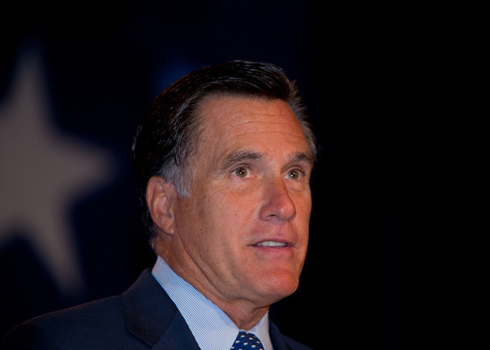Mitt Romney’s much-anticipated health care speech Thursday did not dance around conservative criticism over his support for individual mandates as governor of Massachusetts. Instead he took the issue head on, issuing a thorough and impassioned defense of his state’s health care law — even as he pledged never to apply it to the rest of the country.
“I respect the views of those who think we took the wrong course and who think we should have taken a different course,” he said. “I also recognize that a lot of pundits around the nation are saying that I should say that was a bone-headed idea and I presume folks would think that would be good for me politically. But there’s only one problem with that. It wouldn’t be honest. I in fact did what I thought was right for the people of my state.”
The likely presidential candidate took a professorial approach to his address, delivering it from an auditorium in the University of Michigan and plunging deep into the policy weeds to explain exactly how his Massachusetts law worked. The poorly-lit podium lacked the production values of a major campaign speech and Romney dressed casually, sporting a blazer with no tie. Adding to the lecture aesthetic, Romney’s remarks were accompanied by a Powerpoint presentation.
Romney condemned President Obama’s health care legislation for raising taxes and cutting Medicare. He also labeled the law an unconstitutional violation of state’s rights. But in explaining his own state’s approach he articulately defended many of the Affordable Care Act’s fundamental principles, most notably its use of mandates and its support for citizens in paying for health care premiums.
On the requirement that individuals stay insured, Romney said it was necessary to deal with the “free rider problem,” which left states on the hook for health care costs generated by uninsured patients.
“Ultimately, the bill that we passed was a bill that said either have insurance or we’re going to charge you for the cost of the fact that the state is going to have to cover you if you get seriously ill,” he said, putting a conservative spin on the policy employed by the Affordable Care Act.
He went on to explain how the state provided aid to residents who still couldn’t afford insurance to make the plan work.
“We didn’t create a government insurance program or a government policy that people got,” he said. “No, no. We gave people a premium support program where they could buy their own private insurance of their choice and for the poor we helped them with support.”
Those words could just have easily been applied to the Affordable Care Act, which did not include a “government insurance program” after the public option was removed from the final legislation.
In justifying his criticism of Obama’s health care law, Romney repeatedly employed federalist language, arguing that the ACA violated state sovereignty and ignored their roles as competing “laboratories of democracy.”
“I’m convinced that the Obama administration fundamentally doesn’t believe in that experiment,” he said. “They fundamentally distrust free enterprise and distrust the idea that states are where the power of government reside.”
Romney’s position was not new. He made a similar federalist argument during the 2008 race and, after a brief flirtation with federal mandates in 2009, took a similar tack in recent months. But given the spotlight on the issue, his arguments represented by far the most high-profile and detailed attempt to tackle the issue widely considered his chief vulnerability in the Republican primaries.
Turning to his own position, Romney largely stayed away from details but emphasized that it would be up to states to come up with the bulk of their plans for dealing with the uninsured. He added that, despite criticizing the Medicare cuts in the ACA, he would also reduce costs on the program — though not in the same way that the House GOP currently plans.
“It’s not going to be identical to the Ryan plan, but it shares many of those objectives,” he said of his as-yet-undefined Medicare proposal.
“[Obama’s] involves massive new government spending — they admit to $1 trillion over a decade … mine reduces government spending,” he said, part of a long list he offered of distinctions between the two. “His includes mandates on individuals, on corporations, and on states. Mine includes no mandates, we let the states create their own plans. His is dependent upon the federal government deciding who’s poor and how to insure them. Mine gives the state the responsibility to care for those that are poor and uninsured.”
He concluded: “If I am the nominee on the Republican side of the aisle and I get the chance to debate President Obama, this is what we’re going to be talking about: who has a better plan for America?”






